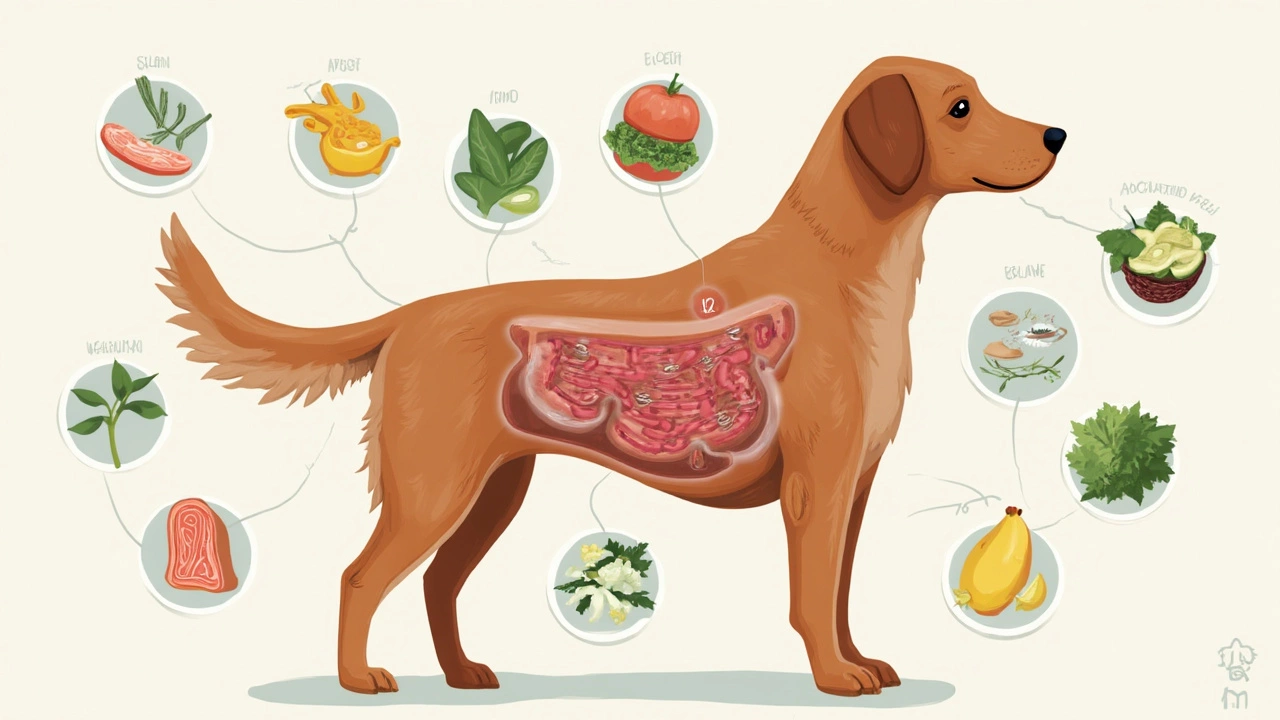Dog owners, have you ever wondered if your four-legged friend might be missing out on a crucial nutrient? Well, one often overlooked issue is vitamin B12 deficiency. It's not just a concern for us humans; our pups need it too! A lack of B12 can lead to a variety of health issues that might just explain why Fido has been feeling a bit under the weather lately.
Now, you're probably asking, what are the symptoms of B12 deficiency in dogs? Well, they can be a bit tricky to spot, but knowing what to watch for can make all the difference. Is your pooch feeling tired all the time? Reduced energy might be one of the first signs. You're used to those zoomies, but now all they want to do is nap? Yup, B12 could be the culprit!
Understanding B12
So, let's dive into the world of vitamin B12, shall we? This nutrient, also known as cobalamin, is super important not just for us but for our furry pals too. It's a key player in forming red blood cells and keeping the nervous system in tip-top shape. Without enough of it, things can start to go a bit haywire.
What makes B12 special is that it's water-soluble, meaning it dissolves in water and is carried through the bloodstream. An interesting little tidbit is that the body doesn’t produce B12 on its own, so it has to come from outside sources, like food or dog supplements.
Where Dogs Get Their B12 From
In the wild, dogs would get their share of B12 from eating animals, like the liver and kidneys, which are rich in this vitamin. But today, with commercial dog food, things have changed a little. Most quality dog foods are fortified with the vitamin, but sometimes, absorption issues can still lead to B12 deficiency in dogs.
Another fun fact: the B12 that our dogs need is a bit different from other vitamins in that it requires a specific protein, called intrinsic factor, to be absorbed in the stomach and intestines. Without that, no matter how much of it they eat, it just doesn't get used properly. Crazy, right?
If you've ever read the back of a dog food bag, you might have noticed B12 listed there. It's listed in micrograms because dogs need it in much smaller doses than humans. What's vital to check is if they're actually absorbing it properly, which might need a vet's input.
Common Symptoms
Spotting a B12 deficiency in dogs can sometimes be a bit of a detective game. They can’t tell us they're feeling off, so we need to watch out for those little signs that something's wrong. One major red flag is fatigue. If your dog is suddenly sluggish and seems like they'd rather snooze than chase a ball, you might want to consider their B12 levels.
Another common symptom is a loss of appetite. Dogs with low B12 might skip meals or eat much less than usual. If you've always had to referee your pup's food bowl, and now they couldn't care less, it's a clear signal to pay attention to.
Now, let's talk about weight loss. Even if your dog is still munching up their meals, they might start losing weight if they're not absorbing nutrients properly. Keep an eye on your pet's physical condition for unexpected changes.
Gastrointestinal Issues
Dogs with B12 deficiency often suffer from digestive troubles. You might notice vomiting, diarrhea, or constipation. None of these are fun for your furry buddy—or you! These symptoms can sneakily sap your pet’s vitality.
In some cases, dogs might even show signs of confusion or depression, which is pretty heart-wrenching. Imagine your happy-go-lucky pooch suddenly becoming a shadow of themselves; it’s all connected to their health and energy levels.
Other Notable Signs
A less common but significant symptom is tingling in their paws, akin to what we know as 'pins and needles.' It's not easy to spot, but if your dog seems to favor one limb or lick their paws excessively, it might be worth investigating.
- B12 deficiency in dogs can also manifest in anemia.
- Keep an eye on pale gums, as they are a telltale sign.
Remember, these symptoms can be caused by a variety of factors, not just B12 deficiency. Always consult your vet for an accurate diagnosis before jumping to conclusions.
| Symptom | Possible Connection to B12 Deficiency |
|---|---|
| Fatigue | Low energy due to insufficient red blood cell production |
| Loss of Appetite | Could indicate digestive system issues |
| Gastro Problems | Stomach upset, diarrhea, or constipation |

Causes of Deficiency
Ever wondered why your dog might be facing a B12 deficiency? There are a few reasons that could be at play here, and knowing these might give you a clearer picture of what's happening in your pup's system.
Diet-related Issues
One of the biggest culprits is diet. Just like with us humans, if a dog isn't getting enough B12 from their food, they're bound to feel it. Commercial dog foods vary hugely in quality, and sometimes they just don't pack all the nutrients dogs need. You might want to check those ingredient labels closely or even consider switching to a different brand that's got a better nutritional profile.
Digestive Disorders
Sometimes, it's not about what goes in but how it's processed. Certain digestive disorders, like inflammatory bowel disease (IBD), can mess with a dog's ability to absorb B12. Even if they're getting enough from their food, their bodies might not be making the most of it.
Pernicious Anemia
This is a bit more rare in dogs but worth mentioning. Pernicious anemia is when the immune system goes a little rogue and attacks the stomach's cells that are responsible for producing a protein necessary for B12 absorption. Vets can run specific tests to confirm this diagnosis.
Genetic Predispositions
Some breeds are just more prone to B12 deficiency. Breeds like Border Collies and Giant Schnauzers have shown a higher likelihood of B12 issues. If you've got one of these breeds, it's something to keep in mind during regular vet check-ups.
| Breed | Predisposition Level |
|---|---|
| Border Collie | High |
| Giant Schnauzer | High |
| Poodle | Moderate |
| Beagle | Low |
In any case, if you're thinking B12 might be an issue for your dog, a trip to the vet is the best place to start. They can run the necessary tests and work with you on a diet or treatment plan to get those B12 levels back on track.
Boosting B12 Levels
Alright, let’s talk about how to get your dog’s B12 back on track. It’s critical because a healthy balance of vitamin B12 can really change the game for your furry friend. First things first, you should know that incorporating a strong source of B12 into their diet can work wonders.
Dietary Changes
Start with food options rich in B12. Think about introducing more dog health supplements that contain B12, or foods like organ meats (liver is a big hit in the B12 department). High-quality commercial dog foods often have B12 added, but always give the label a check to be sure.
Supplements
Sometimes, even with a balanced diet, your dog might need an extra boost. That’s where supplements come in handy. You can find B12 supplements for dogs in various forms, such as tablets, liquids, or even injections if necessary. It’s best to consult with your vet before starting any new supplement, as they'll guide you on the right dosage and form.
| Source | B12 Content |
|---|---|
| Liver (beef, cooked) | 83 micrograms per 3 oz |
| Mackerel (cooked) | 19.0 micrograms per 3 oz |
Check with Your Vet
If supplements and dietary changes don’t seem to do the trick, checking in with your vet is essential. They can offer personalized advice and may suggest a B12 shot, especially if absorption is an issue for your pup. A simple blood test can reveal if the deficiency is more than just a diet fix.
Keep an eye on overall dog health, and don’t hesitate to reach out to a professional if you're unsure. Remember, a balanced diet and timely supplements not only address B12 deficiency but enhance your dog's vitality and overall wellness!
